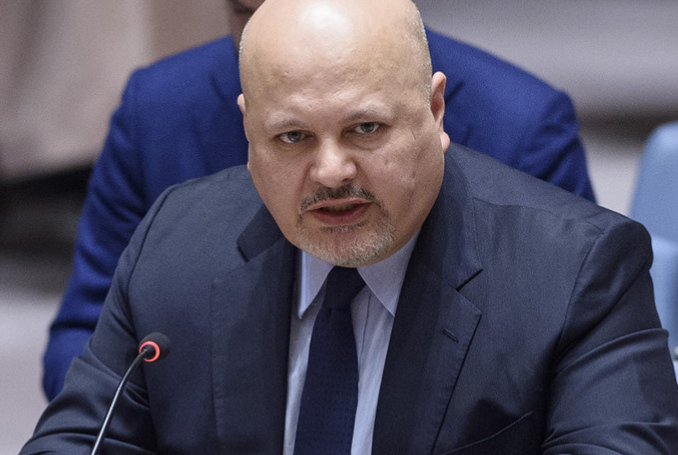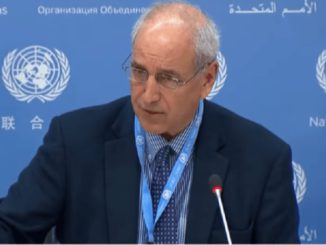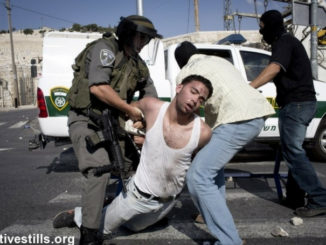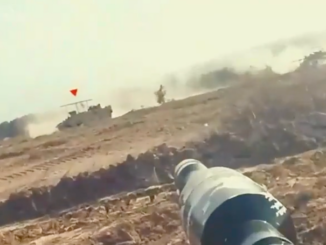
By Romana Rubeo & Ramzy Baroud
Considering that the ICC is one of the most important platforms for victims of war crimes to receive some degree of justice, yet keeping in mind the ICC’s own double standards and shortcomings, what can Palestinians expect?
Israel’s latest war on Gaza, starting on May 9, killed 33 Palestinians, including six children, and wounded hundreds more. Most of those killed and wounded were civilians.
On the first day of the war, Maurice Hirsh, former ‘Head of IDF Military Prosecution’, made a ‘legal’ case for the Israeli war. He wrote the following passage on Twitter:
“Considering the military advantage gained by eliminating these senior terrorists, it is irrelevant to ask how many children were incidentally killed.”
Hirsh has used this kind of logic before. For example, in August 2022, he wrote an article in the Israeli newspaper, The Jerusalem Post, where he justified Israeli army attacks on the civilian population of Gaza:
“In the world of anti-Israel propaganda and the seemingly never-ending cycles of violence with the terrorists in Gaza, the multitude of haters and wantonly ignorant often bandy around the words ‘disproportionate’ and ‘proportionality’ as a means to castigate the Jewish State.”
Though for many, such logic is tantamount to hate speech and outright justification for war crimes, we decided to seek the legal opinion of an international law expert. We asked him if Hirsh’s views are merited in any way.
Triestino Mariniello is an international law expert and a member of the legal team representing Gaza victims before the International Criminal Court (ICC).
We asked Dr. Mariniello to reflect on Hirsh’s comments within the context of legality, or illegality of the latest Israeli war on Gaza.
‘The Principle of Distinction’
“Hirsh’s statement has no validity in terms of international law or humanitarian law,” Mariniello said.
“Even in this latest military operation, Israeli authorities seem to have violated the basic principles of the law of armed conflict, especially the principle of distinction, which forbids any country from directly attacking civilian targets,” he added.
According to Mariniello, the behavior of the Israeli military in its latest attack on the besieged Strip followed a similar pattern to its previous wars.
“The most evident crimes allegedly committed during the latest Israeli military operation are deliberate and intentional attacks on civilian targets and excessive use of force. These violations are nothing new. They have characterized every single Israeli military operation on besieged Gaza throughout the years, including attacks on schools, hospitals, religious sites and media offices.”
Military Targets?
Israel, however, contests that its attacks target military infrastructure, blaming the so-called militants for sheltering among civilians.
But is this the case?
“The Israeli strikes were carried out on residential buildings at night, while the civilian population was asleep, in the presence of people who were not directly participating in the hostilities, and without ongoing hostilities. Basically, they were not military targets, according to international law,” Mariniello said.
In his Jerusalem Post article, Hirsh attacks “the multitude of haters and wantonly ignorant” for emphasizing such concepts as proportionality and disproportionality in international law.
For Mariniello, however, these principles are not a matter of opinion, but fundamental to international law during times of armed conflicts.
“The other pillar of international and humanitarian law which seems to have been ignored by Israel is the principle of proportionality, which prohibits disproportionate attacks. This already happened in the previous military attacks on Gaza.”
Mariniello goes on to speak about two other major principles in international law that were also ‘allegedly’ violated by Israel, in this war and the previous wars: “The principle of necessity and the obligation of precaution, which provides that ‘the civilian population and individual civilians shall enjoy general protection against the dangers arising from military operations.’”
Israel is in direct violation of these principles “because there has been no prior warning (despite) the awareness that civilians were in the building during the night.”
Missing Context
What is usually lacking in the typical analyses of Israel’s military operations on besieged Gaza is the wider context. But is this context relevant when the legality or illegality of war is examined according to international law?
Mariniello answers:
“Context and hostilities cannot be analyzed separately. Rocket firing and bombings make headlines, but we need to remember the permanent and daily impact of Israeli occupation and the military control over the civilian population (which pays the heaviest price), in both the West Bank and Gaza.
“Gaza is still occupied according to international law, and it is subject to a blockade that entered its 17th year. The blockade has a devastating impact on the lives of the Strip’s residents, as highlighted by Palestinian, international and Israeli human rights organizations, which openly describe it as a humanitarian catastrophe.”
Justice Delayed
One thing which constantly frustrates Palestinians is the double standards exhibited by international legal and political institutions in the case of Israel as a serial violator of international law, if compared to many other countries or entities.
Israel has never truly been held accountable for its military occupation, apartheid regime or numerous war crimes committed against Palestinians.
But Palestinians and their supporters are not giving up.
We asked Mariniello whether the Palestinian victims can hope for some form of justice and compensation.
“Direct attacks against civilians and the disproportionate use of force are not only violations of humanitarian law, but are also war crimes, which can be prosecuted even in compliance with Article 8 of the Rome Statute,” which pertains to war crimes, Mariniello said.
Double Standards
Recent history has taught us that, when the international community is determined to punish and sanction a country that violates international law, there are many measures that can be adopted. Immediately after the launch of the Russian military operation in Ukraine in February 2022, for example, thousands of sanctions were imposed on Moscow.
More. The International Criminal Court (ICC) issued arrest warrants for Russian President Vladimir Putin and Commissioner for Children’s Rights Maria Lvova-Belova, despite the fact that neither Russia nor Ukraine are members of the ICC. This means that the Court was not granted automatic jurisdiction to investigate crimes committed during the ongoing conflict.
In the case of Palestine, despite the launch of an investigation in March 2021, the ICC probe seems to be at a stalemate. How is one to explain all of this? Is this yet another case of double standards?
Mariniello,
“From a legal point of view, the double-standard policy applied by Western countries is unacceptable. International law mechanisms cannot be applied in some cases and ignored in others. For example, 43 countries have referred to the ICC in the case of Ukraine. They include five countries that have opposed the ICC probe in Palestine.
“This selectivity is not only concerning when it comes to the international community, but also the ICC. The ICC represents the only possibility of justice for the victims of war crimes or crimes against humanity, considering the systematic attacks against civilian populations.”
As for the claim that Israel is a democracy with a thriving legal system, and is, supposedly, capable of trying its own alleged war criminals, Mariniello retorts,
“The Israeli judicial system has shown, time and again, that it is not able to provide justice to the victims of these abuses. We recently witnessed this in the case of the killing of Palestinian American journalist Shireen Abu Akleh.”
Karim Khan
Considering that the ICC is one of the most important platforms for victims of war crimes to receive some degree of justice, yet keeping in mind the ICC’s own double standards and shortcomings, what can Palestinians expect?
This question becomes even more relevant when we keep in mind the fact that, according to the ICC’s Assembly State Parties report, the budget allocated for the Palestine investigation was minimal. This is hardly promising.
“Unfortunately, since the advent of Karim Khan as ICC’s top Prosecutor, the investigation came to a standstill,” Mariniello said. “Khan has shown that in other cases the procedures can be very rapid, when there is the will to proceed, as in the case of Ukraine.”
Unfortunately, the ‘will to proceed’ seems absent in the case of Palestine.
“Despite the fact that the procedure regarding Palestine is well documented and had been launched as early as 2009, the current Prosecutor appears to have no intention to proceed.” For Khan, “Palestine does not seem a priority.”
“Many critical voices have condemned this attitude, highlighting how the Prosecutor is only interested in the investigations that enjoy the support of the United States and its powerful allies. These accusations seem to be reflected in the decision to freeze the investigations into alleged war crimes in both Afghanistan and Palestine.”
– Romana Rubeo is an Italian writer and the managing editor of The Palestine Chronicle. Her articles appear in many online newspapers and academic journals. She holds a Master’s Degree in Foreign Languages and Literature and specializes in audio-visual and journalism translation.
– Dr. Ramzy Baroud is a journalist, author and the Editor of The Palestine Chronicle. He is the author of six books. His latest book, co-edited with Ilan Pappé, is ‘Our Vision for Liberation: Engaged Palestinian Leaders and Intellectuals Speak Out’. His other books include ‘My Father was a Freedom Fighter’ and ‘The Last Earth’. Baroud is a Non-resident Senior Research Fellow at the Center for Islam and Global Affairs (CIGA). His website is www.ramzybaroud.net







